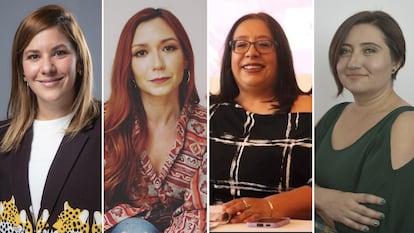They are girls, not mothers: Latin American women advocate against child pregnancy
Marianny Sánchez Núñez, Paula Barrios, Catalina Martínez Coral and Ana Vera are some of the visible faces of the international movement against child pregnancy. They have been involved in litigation before the UN Human Rights Committee, which has condemned Ecuador and Nicaragua for failing to protect girls

Latin America and the Caribbean hold a dishonorable record that, inexplicably, doesn’t shock society. The region has the second-highest percentage of births to girls under the age of 15, only surpassed by Africa. This means that girls who are frequently the victims of sexual violence, often assaulted by family members, are forced to be mothers. They see their lives cut short, forced to dedicate themselves to motherhood, due to the decisions made by judges, doctors and politicians. The figures vary between countries, but the latest available data, collected in 2021, indicates that, in the region, the birth rate was 53.2 births per 1,000 girls who were between the ages of 10 and 14.
That’s why, on May 29, 2019, four organizations — the Center for Reproductive Rights, Planned Parenthood Global, the Guatemala-based NGO Mujeres Transformando el Mundo (“Women Transforming the World”) and the Ecuador-based Surkuna — joined together to advance joint international litigation. In an unprecedented move, they presented the cases of Norma from Ecuador, Fátima from Guatemala, and Lucía and Susana from Nicaragua — four girls who survived sexual violence and were forced into motherhood — before the United Nations. On January 20, the United Nations Human Rights Committee condemned the states of Ecuador and Nicaragua for violating the human rights of three girls who survived sexual violence and were denied access to abortion.
Catalina Martínez Coral, Ana Vera, Paula Barrios and Marianny Sánchez Núñez are some of the women who are leading the movement against child pregnancy. They’re seeking to shake up the region when it comes to the subjects of sexual violence and forced motherhood.
Catalina Martínez Coral
A lawyer from Cali, Colombia, she’s built her career through international human rights organizations. She’s a vice president at the Center for Reproductive Rights, responsible for overseeing programming in Latin America and the Caribbean. Her face and her work are well-known, because she’s one of the founders of the Causa Justa (“Just Cause”) movement, which helped decriminalize abortion in Colombia. Today, she has embarked on a regional project. And, while Martínez recognizes that it’s transgressive, her work gives meaning to her life. She accompanies girls from different countries throughout the region who have been forced into motherhood, litigating their respective cases.
“It goes beyond judicial decisions being handed down. [You need to be] there, like a pebble in a shoe, until the states comply,” she affirms, in a gentle yet firm tone. She knows that the aforementioned cases are just a sampling of the sexual violence committed against girls in the region, as well as of other patterns, such as impunity within the justice system and the re-victimization that sustains these violations.
In procedural terms, each case is presented and proceeds individually to the UN Human Rights Committee. But, Martínez notes, what’s innovative is that, by presenting them collectively, they demonstrate the magnitude of the problem. “We tell the United Nations: ‘this is what’s happening in the region.’ And we’re not saying it with just one case; there are five from countries with different legal contexts, where all the girls are going through the same situation.”
The litigation then aims to secure individual social and health reparations for these specific victims, who are now adults. But there’s also an attempt to set a precedent for the entire region. “We also ask that the committee be able to generate robust recommendations regarding the eradication of sexual violence and more structural public policy measures that the states have to adopt; [for example], to tell the states that they must decriminalize abortion,” she adds.
In 2023, the UN Committee on the Rights of the Child condemned the Peruvian state for violating the rights of Camila. As a child victim of rape, she was taken to court for having an abortion. And, at the moment, Martínez and her team are awaiting a decision in the Ecuadorian case.
Marianny Sánchez Núñez
“Forced motherhood in Latin America is a silent epidemic. The reality is [visible], but it’s not talked about enough,” says Marianny Sánchez. Born in Puerto Ordaz, Venezuela, in 1985, she’s a communications expert, a migrant and a feminist. She attributes the regional silence to, among other reasons, “the painfulness of the situation. It’s as if no one wants to open that wound.”
Sánchez is the communications director for Planned Parenthood in Latin America. She tells EL PAÍS that she’s always been concerned that this phrase — “the second-highest percentage of births to girls under the age of 15″ — seems to have become just another sentence that’s mentioned in passing via official press releases from organizations, with nobody truly measuring its seriousness. In 2016, the organization carried out an investigation that recounted in depth the testimonies of victims of sexual violence and child pregnancy throughout the region. Titled Stolen Lives, it showed everything that girls forced into motherhood have lost.
“But we didn’t want it to remain as a piece of research that five academics were going to consult when doing an analysis of forced motherhood in the region,” she points out. They had to act. So, they thought they should develop a communications platform, along with a legal commitment. What came next was to select emblematic cases, so as to bring them before the justice system. “[We had to ensure] that these stories weren’t being told in vain and could transform the legal approach to sexual violence and forced motherhood among girls.”
Sánchez has a Master’s degree in Gender, Identity and Citizenship and has completed postgraduate work in Cultural Studies. She believes that there’s a toxic combination of factors that allows for the existence of this scourge in the region. The problem originates in the normalization of the sexual violence that exists within families and communities. There’s rampant impunity, as well as a phenomenon of machismo that devalues and deprives women and girls of their autonomy. The message is given that “a girl’s body can be consumed and violated.” But, she emphasizes, there’s also “a romanticization of the idea of motherhood in our region, according to which it doesn’t matter how you got [pregnant]: [it doesn’t seem to matter] if you were raped as a child, if you went through hell and got pregnant.”
For this reason, beyond the litigation that seeks to ensure that no case of sexual violence goes unpunished, the coalition of organizations demands that forced motherhood be recognized a form of cruel, inhuman treatment and torture. In essence, the objective is to guarantee the “right of girls to enjoy their childhood” throughout Latin America and the Caribbean.
Ana Vera
Ana is a lawyer and sociologist. She was born in Quito, Ecuador, in 1984. A member of the Surkuna Foundation (the word surkuna meaning “freedom” in Quechua) she notes that, in addition to the litigation process, the most valuable thing about the movement — known as “They are Girls, Not Mothers” — is that it questions the normalization of motherhood in childhood. “It has raised awareness,” she explains. “Suddenly, people are starting to question [the status quo] and say that [girls] shouldn’t be mothers. It helps the social [aspect surrounding the] decriminalization of abortion.”
While her goal is to ensure that no girl is forced into motherhood, she insists that public policies are required for girls who have already been forced to become mothers. In her country, where six out of 10 girls between 10 and 14 years old who give birth were impregnated as a result of sexual assault, victims and their children have few options: either they go to the only state shelter in Quito and live in crowded, poor conditions, or they seek refuge in civil society shelters that receive “miserable” levels of public support. Otherwise, they have to go to orphanages, or stay in their homes, where their aggressors often live.
The shelters cannot cover everything and constantly require charitable support to buy school supplies or toys for the girls and their children. The aggravating factor is that the victims can no longer stay in the shelters upon turning 18. “It’s absolutely brutal, because they leave and don’t even know how to manage money; they don’t have a job, [nor resources] to rent a house for themselves and their children,” Vera explains. She proposes that girls who are forced to be mothers should receive the subsidies that the state gives to people living in poverty. This money can subsequently be placed in a savings account, which they can access upon reaching the age of 18 while they look for work.
Although her job is “legal first aid” (she’s responsible for heading the litigation strategy), in her closeness to the affected girls, she’s seen that their main need is that they be allowed to continue being children. She remembers the case of a 15th birthday party that was held for several of the girls: they received donated dresses, had hairdressing appointments and got to forget about their forced motherhood for a little while.
“We’re very concerned when we see, for example, girls asking people in the shelter to look after their children so they can play or have a moment to rest, because they’re exhausted from caring for them,” Vera laments. She’s been actively following Norma’s case: a decision has just been made by the Human Rights Committee.
Paula Barrios
Despite the 1,400 miles that separate her from Ecuador, the reality that Paula Barrios sees in Guatemala is very similar. There, more than 1,500 sexually abused girls become mothers every year.
Barrios is a lawyer and general coordinator of the NGO Mujeres Transformando el Mundo (“Women Transforming the World”), which supports girls, adolescents and women who are the survivors of sexual violence. The organization also supports Fátima, whose case is currently before the UN Human Rights Committee.
“We hope that, at the Latin American level, the importance of comprehensive sexual education will be brought to the fore… that we’ll have tools to protect ourselves [and] to discuss what’s happening. There [must be] immediate response mechanisms so as to prevent sexual violence, which been increasing over the last five years,” she says.
For her, the normalization of the idea that women are born to be mothers affects the critical situation of child motherhood. “So, it doesn’t matter if a girl gets pregnant at 10 or 12 years old… it’s thought that she’s just [having children early],” Barrios warns.
Translated by Avik Jain Chatlani.
Sign up for our weekly newsletter to get more English-language news coverage from EL PAÍS USA Edition
Tu suscripción se está usando en otro dispositivo
¿Quieres añadir otro usuario a tu suscripción?
Si continúas leyendo en este dispositivo, no se podrá leer en el otro.
FlechaTu suscripción se está usando en otro dispositivo y solo puedes acceder a EL PAÍS desde un dispositivo a la vez.
Si quieres compartir tu cuenta, cambia tu suscripción a la modalidad Premium, así podrás añadir otro usuario. Cada uno accederá con su propia cuenta de email, lo que os permitirá personalizar vuestra experiencia en EL PAÍS.
¿Tienes una suscripción de empresa? Accede aquí para contratar más cuentas.
En el caso de no saber quién está usando tu cuenta, te recomendamos cambiar tu contraseña aquí.
Si decides continuar compartiendo tu cuenta, este mensaje se mostrará en tu dispositivo y en el de la otra persona que está usando tu cuenta de forma indefinida, afectando a tu experiencia de lectura. Puedes consultar aquí los términos y condiciones de la suscripción digital.









































